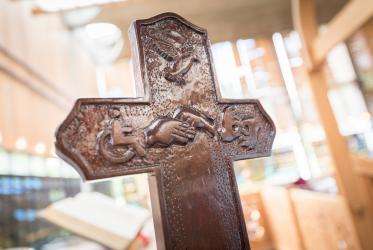By Peter Kenny (*)
Faith leaders "should shout from the rooftops that AIDS is not a punishment from God but a medical condition which is preventable", the former leader of South Africa's Anglican church, Archbishop Njongo Ndungane, has told the World Aids Campaign.
Ndungane was speaking in an interview for the Amsterdam- and Cape Town-based World Aids Campaign, founded by UNAIDS, ahead of the 20th anniversary of the marking of 1 December as World AIDS Day. The campaign says World AIDS Day is a time of "global solidarity for a pandemic that has led to over 25 million deaths, with an estimated 33 million people currently living with HIV worldwide".
Ndungange, who now heads African Monitor, a continental development agency, said that AIDS was "manageable and treatable although not curable", as well as not being a punishment from God.
He added, "Faith leaders should hence commit themselves to working towards achieving a generation without AIDS, and show loving care and support for those infected. They should develop and implement imaginative strategies to fight stigmatisation, ensure that infected people have access to the essential needs like nutrition and medical care, as well as encourage those not infected to stay uninfected."
Linda Hartke, who heads the Geneva-based Ecumenical Advocacy Alliance (EAA), which campaigns for food and trade justice as well as for those who are HIV positive, said the 20th anniversary of World AIDS Day was a time "to take stock of the faith-based response to HIV and AIDS".
The EAA is composed mainly of Christian organizations - including the World Council of Churches - but it also counts amongst its members agencies from other religions.
Hartke told Ecumenical News International, "We can be inspired by the committed efforts of people of faith all over the world who have for so long provided care and support for a concerted global response that will reverse the spread of HIV, and eventually eradicate AIDS."
She noted, "Religious leaders living with or personally affected by HIV, and who have spoken out against stigma, discrimination and injustices and vulnerabilities that fuel the spread of HIV, have particularly strengthened and expanded effective faith-based responses."
Still, Hartke had cautioned earlier in November that with millions still infected each year "and with two-thirds of adults and 85 percent of children living with HIV/AIDS not receiving urgent treatment, we need full and committed leadership and action to reach universal access to prevention, treatment, care and support".
Hartke said an estimated 2.1 million children aged under 15 are living with the Human Immunodeficiency Virus, or HIV, "Yet children remain largely forgotten in global and national efforts to address HIV and AIDS. This is especially the case for children's access to diagnostic testing for HIV and medicines to treat HIV, known as antiretrovirals. Currently, only 15 percent of children in need of HIV treatment have access to it."
(*) Peter Kenny is the editor-in-chief of Ecumenical News International (ENI).
World Council of Churches' resources on HIV and AIDS:
WCC programme on HIV-competent churches
Ecumenical HIV an AIDS Initiative in Africa (EHAIA)








